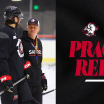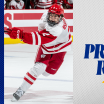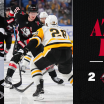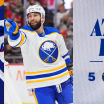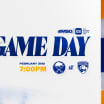Jeff Blashill was attempting to take Seth Appert's job when the two first met in 1994. Both were goaltenders at Ferris State University, Appert a junior and Blashill a freshman.
It was a competitive situation, yet it spawned a close friendship that lasts to this day.
"Seth took me under his wing, for sure, in those early days and definitely, I think it speaks to the character he had," Blashill said. "Here's a direct competitor for the position that he wants, and he embraced me. Again, I've always felt like that speaks to the type of person he is."
Blashill, now the head coach of the Detroit Red Wings, could see coaching qualities in Appert even back then. Appert joined on as a graduate coach at Ferris State, then won two national championships as an assistant at the University of Denver. His first head coaching gig came at Rensselaer Polytechnic Institute, where he spent 11 seasons before joining the US National Team Development Program in 2017.
During that time, Blashill recruited Appert to be an assistant for Team USA at back-to-back IIHF World Championships. Seeing how Appert interacted with some of the world's best players is one of the reasons Blashill believes his friend his well-suited for his new job as coach of the Rochester Americans.
Red Wings' Blashill saw leadership qualities in Amerks' Appert early on
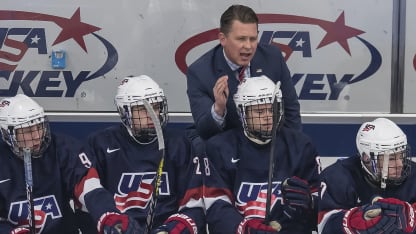
© Dave Reginek/Getty Images
"First off, I do think coaching is coaching," Blashill said. "I think the principles that make you a good coach in [youth] hockey, in junior hockey, in college hockey, in the NHL, they're all the same. The principles are the same.
"There are unique challenges when you become a coach at the World Championship level, the level of player that's involved there. We had some of the elite, some of the best in the NHL on our team. I think Seth did a great job in his role there. He interacted with the guys there and I think they had a lot of respect for him. I think if you talked to the players who were on those teams, they would tell you they respected him a great deal."
During those tournaments, Appert saw a roster of NHL stars embrace his teaching philosophy - which, like Sabres coach Ralph Krueger, leans on honest communication and trust. The experience helped convince Appert he could make the jump to coaching pro hockey.
"They want to have a relationship, they want to have that trust, they want the information that's going to make them better and make the team better," Appert said. "I think those two things combined really got my mind thinking that coaching in pro would be the next challenge for me and something I got very excited about."
Appert's job in Rochester will be twofold. His primary mandate is to develop players for the Sabres, though icing a winning roster at the AHL level will be a crucial ingredient. He and general manager Kevyn Adams share the philosophy that the two ends are intertwined.
Appert already has experience maintaining that balance from his time at the helm of the USNTDP, where his job was to win games while also developing players who could one day make the NHL and become the future faces of USA Hockey.
"If we develop better players, we're going to become a better team," Appert said. "That is a big thing for me, and certainly that's been shaped even more so in my time with the national program. We focus at the national program on making our players better. We don't save energy all the time for games on Friday and Saturday - we really sell out in practice; we sell out in the weight room.
"We believe that taking the development mindset on a daily basis in how we practice and how we hit the weight room is going to make the players better, and eventually as the players become better, our team is going to become better. So, we believe, I believe, that development leads to winning."
Blashill, who won a Calder Cup as head coach of Grand Rapids in 2013 and was named AHL coach of the year the following season, has experience maintaining that balance. A key aspect of development is giving young players a chance to play in crucial positions, but also making sure they earn it.
"Players have to earn what they get," Blashill said. "There is zero question about that. If you don't have players earn their opportunities, then entitlement sets in. But they have to have the opportunity to earn it, and that's important. I think that's important in the American League. There can't be so many roadblocks there that they don't have that opportunity to earn jobs. Real opportunities.
"The job might be playing time, might be playing in the lineup. The job might be killing penalties, that job might be on the power play. You have to have the opportunity to earn that. And if they earn that, they should get it. If they don't earn it, they have to go to work and find a way to be successful at it."
Having talked through the position with Appert, Blashill feels the Amerks are in good hands.
"I think Seth understands that balance," he said. "I think that's part of the balance he's had at the U.S. National Development Program, is he wants each one of those kids to succeed but they can't just be given things. I've watched him make guys earn it and I've watched him give them opportunities. Sometimes they grab it right away, sometimes it takes two or three cracks at it.
"Ice time is a precious thing. Ice time is one of the coach's greatest tools to make sure guys are doing things right, make sure their habits are great. So, ice time can't just be given regardless of how you play. If you don't do certain things, you don't get the ice time. When you do those things, you get more ice time. I think Seth knows how to use that based on his experience at the U.S. National Program."

